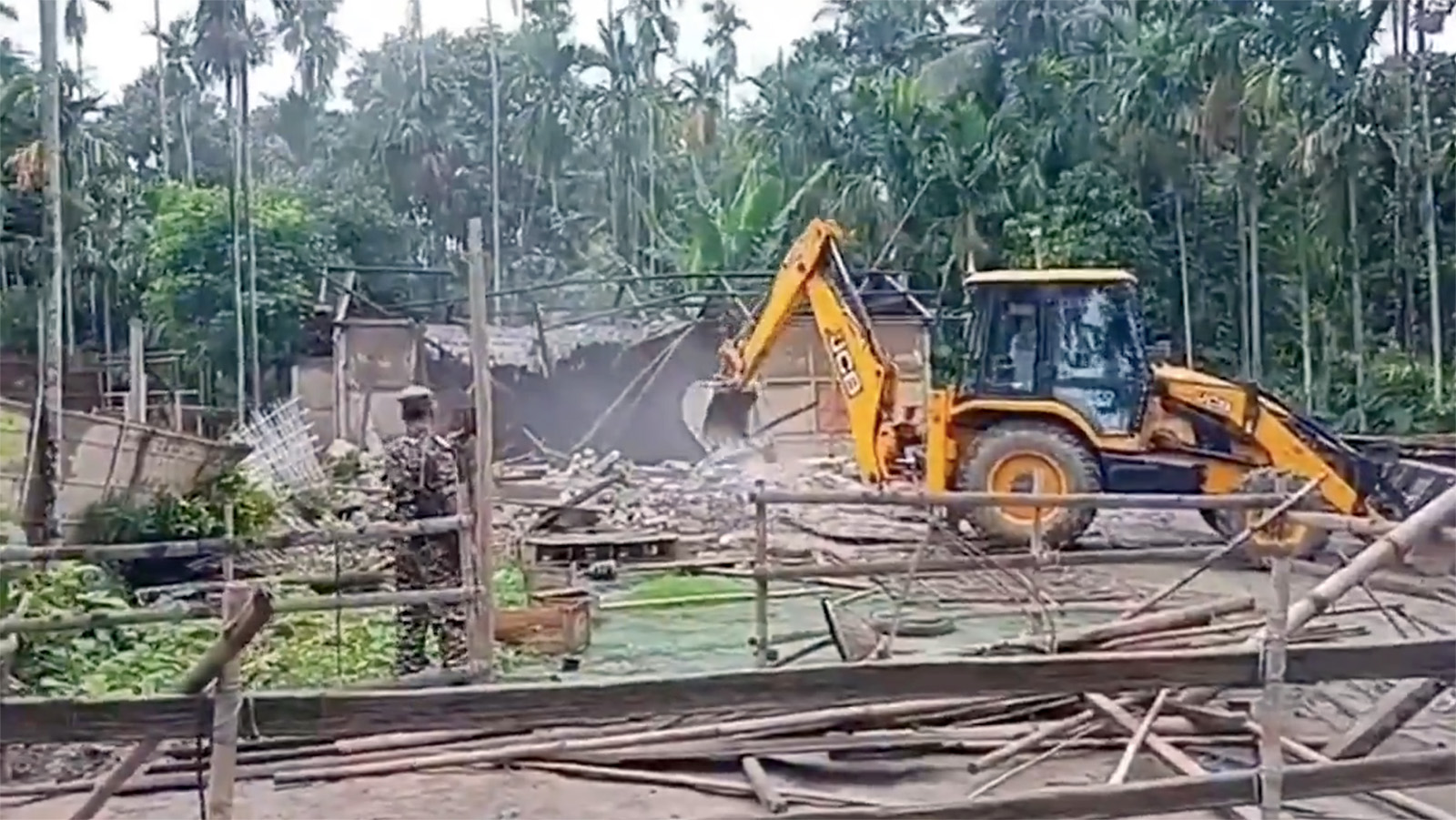
(RNS) — In India’s northeastern state of Assam, a brutal campaign of displacement is underway. Thousands of families, mostly Bengali-origin Muslims, have been stripped of their homes, their communities and their place in the only country they have ever known. Yet, the dire humanitarian crisis has barely received attention beyond India’s borders.
Since early June, the state government led by Prime Minister Narendra Modi’s Bharatiya Janata Party has forcibly evicted nearly 6,000 Bengali-origin Muslim families, displacing men, women and children. Bulldozers have flattened homes, mosques and small businesses. Entire neighborhoods have been reduced to rubble, leaving tens of thousands homeless and huddled under tarpaulin sheets in the monsoon rains. On July 17, during an eviction drive, local police opened fire on protesters, killing a 19-year-old Muslim youth and injuring several others.
These evictions and demolitions violate both Indian and international human rights law. They are creating a new class of internally displaced people who are stateless in practice if not yet in law within India’s borders. These evictions and demolitions serve two purposes: to punish a minority population and to send a message, broadcast through social media and news footage of shattered homes and families sleeping under open skies, that Bengali Muslims in Assam can never be secure, no matter how many generations they’ve lived there.
What is unfolding in Assam is a clear case of ethnic cleansing, with a systematic effort to change the demographic makeup of a region by forcefully displacing the Bengali-origin Muslim citizens. The bulldozers may be operated by the state, but their work is reinforced by a political climate steeped in Hindu nationalism.
Himanta Biswa Sarma, the state’s chief minister, is known for regularly delivering anti-Muslim hate speeches and has justified this brutal campaign under the garb of removing alleged “illegal Bangladeshi immigrants” and clearing “encroachment on forest land.” In reality, the near-daily evictions target the Bengali-origin Muslims, many with family roots in Assam spanning generations.
Sarma’s rhetoric paints Bengali Muslims as demographic and cultural threats, priming public opinion for their removal. In May, he announced a plan to grant arms licenses to “indigenous” residents in five Muslim-majority border districts, citing the need to counter “unlawful threats from hostile quarters.”
For decades, Bengali-origin Muslims in Assam have been cast as “outsiders,” accused of being illegal migrants from neighboring Bangladesh regardless of how long they’ve lived in India. The National Register of Citizens exercise in 2019 was the clearest manifestation of this hostility. Nearly 1.9 million people, including Muslims, found themselves excluded from the citizenship rolls, facing the terrifying prospect of statelessness.
NRC has drawn international criticism, with human rights groups, including government bodies like the U.S. Commission on International Religious Freedom, warning that the law could be paired with the discriminatory Citizenship (Amendment) Act, which creates a faster path to citizenship for non-Muslim migrants, “to create a religious test for Indian citizenship and could lead to the widespread disenfranchisement of Indian Muslims.” Those warnings have now proved prophetic. Last month, Sarma directed the foreigners tribunals, quasi-judicial bodies tasked with determining whether a person is staying illegally in India, to drop cases against Hindus and five other non-Muslim religious communities, provided they entered the state on or before Dec. 31, 2014, citing the CAA as justification.
When combined with the state’s latest eviction drive, the move looks less like routine administration and more like the next stage of a calculated campaign to purge Bengali-origin Muslims from Assam. Importantly, experts see this campaign as a deliberate ploy by the BJP, which relies on polarization as a political strategy, with state elections due early next year.
Local Hindu nationalist and ethno-nationalist groups have joined in, conducting door-to-door “verification” campaigns to identify Bengali Muslims. In July alone, 18 rallies and protests across 14 districts of Assam, organized or endorsed by BJP leaders and supporters, featured hate speeches and calls for more demolitions targeting the properties of alleged “illegal Bangladeshi immigrants,” according to the latest data from research groups.
The conditions on the ground are tinder for mass violence. History offers too many examples of how sustained campaigns of dehumanization and displacement can ignite into something far worse. The combination of state-backed action, vigilante participation and inflammatory rhetoric from the members of the ruling party creates an environment where mass violence is imminent.
The situation in Assam should not be treated as an internal matter, but as a looming humanitarian disaster with international implications. The international community has, for too long, been willing to overlook India’s treatment of its Muslim minority. Strategic and economic ties with New Delhi have taken precedence over human rights concerns. But silence now will be complicity.
The United Nations, the European Union, the U.S. and other democratic governments must urgently address the campaign of ethnic and religious cleansing in Assam. They must press India to halt the evictions and demolitions, provide restitution to displaced families and ensure no one is stripped of citizenship on the basis of ethnicity or religion.
International pressure is essential, but Indian civil society must ultimately take the lead. The NRC exercise six years ago showed that public mobilization can slow the machinery of exclusion, even if it cannot fully stop it. Lawyers, journalists, human rights defenders and grassroots activists must act to protect their fellow citizens. The opposition parties must stop treating Assam as a local issue. The methods perfected in the state using land laws, citizenship registers and administrative pretexts to target minorities will not remain confined to one state. If left unchecked, Assam’s campaign of ethnic cleansing could become the template for a nationwide purge of Muslims.
(Mohammed Jawad is president of the Indian American Muslim Council. The views expressed in this commentary do not necessarily reflect those of Religion News Service.)
